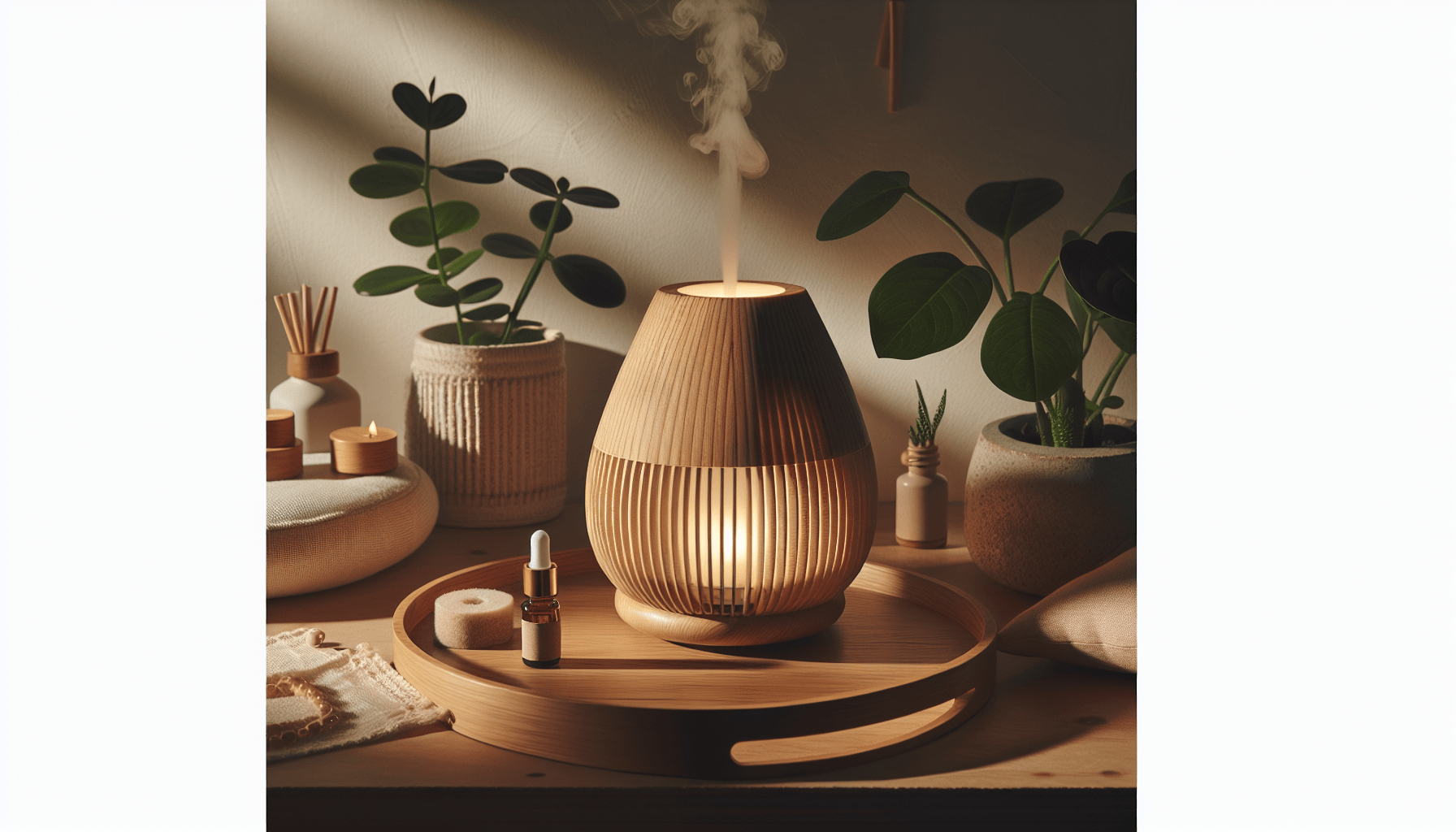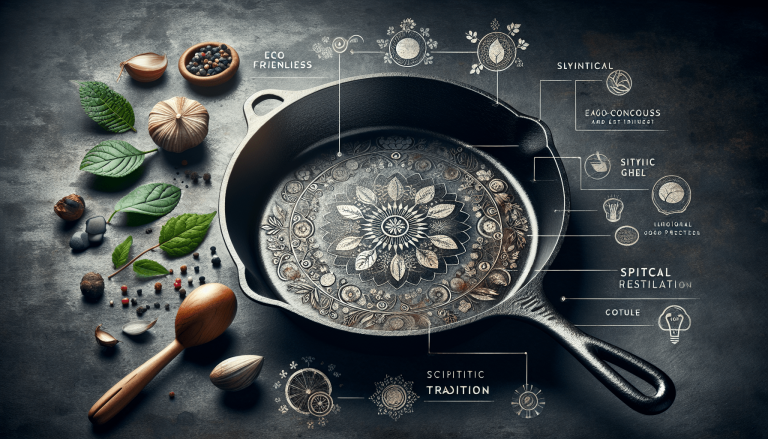Eco-friendly Household Products That Complement Spiritual Practices
Let’s explore the fascinating world of eco-friendly household products that effortlessly harmonize with your spiritual practices. From sustainable cleaning supplies that cleanse your space while nurturing the environment to eco-conscious decor that enhances tranquility and mindfulness, this article will guide you in finding the perfect products to align your home with your spiritual journey. Discover how small changes in your everyday choices can make a profound impact on both your personal well-being and the health of our planet.
Natural Essential Oils and Diffusers
Introduction to essential oils
Essential oils have been used for centuries for their various benefits and are an integral part of many spiritual practices. These concentrated plant extracts offer a range of natural aromas that can invoke feelings of relaxation, upliftment, or even spiritual awakening. Extracted from the leaves, flowers, bark, and roots of plants, these oils capture the essence of nature in a bottle.
Benefits of diffusing essential oils
Diffusing essential oils is a popular method of enjoying their benefits. When inhaled, the molecules of the oils interact with the olfactory system, which is closely linked to our emotions and memories. Different oils have different effects on the mind and body. For example, lavender oil is known for its calming properties and can promote a sense of tranquility, while citrus oils like lemon or orange can uplift the mood and invigorate the senses.
Aside from their fragrance, essential oils also offer a range of therapeutic benefits. For example, eucalyptus oil is commonly used to relieve congestion and promote respiratory wellness, while peppermint oil is known to aid digestion and provide a refreshing sensation. When diffused, these oils can permeate the entire room, transforming your space into a sanctuary of scents and serenity.
Environmental impact of synthetic fragrances
While synthetic fragrances may be more affordable and easily accessible, they often come at a cost to both the environment and our health. Many conventional fragrances contain synthetic chemicals that can contribute to air pollution and may even be harmful to human health. These chemicals can irritate the respiratory system, trigger allergies, and may have long-term effects on our overall well-being.
Using natural essential oils, on the other hand, allows us to enjoy beautiful fragrances while minimizing the negative impact on the environment. The extraction of essential oils from plants is a sustainable process that does not involve the use of harmful chemicals or result in pollution. Opting for natural essential oils and diffusers not only benefits our well-being but also supports a healthier and more sustainable planet.
Brands that offer eco-friendly essential oils
When choosing natural essential oils, it’s important to select those that are ethically sourced and produced. There are several brands that specialize in offering eco-friendly essential oils, such as Aura Cacia, Plant Therapy, and Mountain Rose Herbs. These brands prioritize sustainability, transparency, and ethically sourced ingredients. By supporting these brands, you can ensure that your essential oil collection aligns with your values and the respect you have for nature.
Types of diffusers
There are several types of diffusers available in the market, each offering a unique diffusing mechanism and aesthetic appeal. Some popular options include:
-
Ultrasonic diffusers: These diffusers use water to disperse a fine mist of essential oils into the air. They often double as humidifiers, adding moisture to the atmosphere, which can be beneficial for dry environments.
-
Nebulizing diffusers: These diffusers work by transforming essential oils into a fine mist without the use of heat or water. They are a great option for those who prefer a more potent aroma and don’t require added humidity.
-
Reed diffusers: Reed diffusers consist of a glass bottle filled with essential oils and reed sticks that absorb the oil and disperse the fragrance into the air. They are a low-maintenance option and can provide a constant, subtle scent throughout the day.
-
Electric heat diffusers: These diffusers utilize heat to gently warm the essential oil, releasing its fragrance into the room. While they may not retain the full therapeutic benefits of the oils, they are still an effective way to enjoy the scents.
When it comes to choosing a diffuser, consider your personal preferences, the size of your space, and the desired intensity of the fragrance. Experimenting with different types of diffusers can help you find the perfect match for your spiritual practices.
Eco-friendly Cleaning Supplies
Importance of using eco-friendly cleaning supplies
When it comes to spiritual practices, maintaining a clean and harmonious environment is essential. However, it’s equally important to consider the impact of the cleaning products we use on our health and the planet. Conventional cleaning products often contain harsh chemicals that can have adverse effects on both our well-being and the environment. By opting for eco-friendly cleaning supplies, we can ensure a clean space without compromising our health or the earth’s.
Harmful chemicals present in conventional cleaning products
Many traditional cleaning products contain ingredients such as ammonia, sodium hydroxide, and synthetic fragrances, which can be harmful when inhaled or come into contact with the skin. These chemicals can irritate the respiratory system, trigger allergies, and even contribute to long-term health issues. Moreover, when these products are rinsed down the drain, they can contaminate water sources and have a negative impact on aquatic life.
Eco-friendly alternatives
Fortunately, there are many eco-friendly alternatives available that can effectively clean and disinfect your home without the use of harsh chemicals. These products are made from natural, plant-based ingredients and are biodegradable, ensuring minimal environmental impact. Look for cleaning supplies that are labeled as “green,” “natural,” or “eco-friendly,” and read the ingredient list to ensure they do not contain harmful chemicals.
DIY cleaning solutions
In addition to commercial eco-friendly cleaning products, you can also create your own DIY cleaning solutions using ingredients commonly found in your pantry. For example, a mixture of vinegar and water can effectively clean glass surfaces, while baking soda can be used as a gentle scrub for stubborn stains. Lemon juice, hydrogen peroxide, and essential oils also have natural cleaning properties and can be used in various DIY cleaning recipes.
Sustainable cleaning tools
To further enhance your eco-friendly cleaning routine, consider investing in sustainable cleaning tools. Swap out disposable paper towels for reusable microfiber cloths or towels made from organic cotton. Choose scrub brushes made from sustainable materials like bamboo, which is known for its rapid growth and minimal environmental impact. Additionally, opt for reusable mop heads or steam mops instead of disposable options. By choosing these sustainable alternatives, you can reduce your household waste and contribute to a cleaner planet.
Organic and Sustainable Bedding
Why choose organic and sustainable bedding
Quality sleep is an essential part of spiritual well-being, and the bedding we choose plays a significant role in creating a restful sleep environment. Organic and sustainable bedding not only promotes a healthier sleep by reducing exposure to harmful chemicals but also supports farmers and manufacturers who prioritize ethical and sustainable practices. By choosing organic and sustainable bedding, you not only enhance your sleep experience but also contribute to a more sustainable and equitable industry.
Benefits of organic cotton bedding
Organic cotton bedding is becoming increasingly popular due to its numerous benefits. Unlike conventional cotton, which is heavily treated with pesticides and synthetic fertilizers, organic cotton is grown without the use of these harmful chemicals. This means that when you choose organic cotton bedding, you reduce your exposure to potentially toxic residues that can be found in non-organic options.
Organic cotton bedding is also softer and more breathable, providing a more comfortable sleeping experience. It is hypoallergenic and less likely to cause skin irritations, making it ideal for those with sensitive skin or allergies. Additionally, organic cotton is a sustainable choice as it promotes soil health, preserves biodiversity, and supports the livelihoods of organic cotton farmers.
Materials to avoid
When choosing organic and sustainable bedding, it’s important to be mindful of the materials used. Avoid bedding made from synthetic fibers such as polyester, nylon, and acrylic, as these materials are derived from non-renewable resources and can contribute to microplastic pollution. Likewise, steer clear of bedding made from conventional cotton, as it often involves intensive pesticide usage and has a higher carbon footprint compared to organic cotton.
Brands offering organic and sustainable bedding
Several brands specialize in offering organic and sustainable bedding options. Companies such as Coyuchi, Boll & Branch, and Saatva source organic materials and prioritize sustainable manufacturing practices. These brands ensure that their products meet rigorous environmental and ethical standards, allowing you to create a tranquil sleep sanctuary while minimizing your ecological footprint.
Caring for organic bedding
To prolong the lifespan of your organic bedding, it’s important to follow proper care instructions. Organic cotton bedding should be washed with mild, eco-friendly detergents and avoid using bleach or fabric softeners, as these can degrade the fabric and reduce its sustainability. Line drying or using a low-heat setting on your dryer not only helps preserve the integrity of the materials but also saves energy. By taking care of your organic bedding, you can enjoy its benefits for years to come.
Sustainable and Ethically Sourced Candles
The significance of candles in spiritual practices
Candles have long been used in spiritual practices as a way to create ambiance, set intentions, and establish a connection with the divine. The soft flickering flame and gentle glow create a sense of serenity and focus, allowing individuals to enter a meditative state or conduct ritual ceremonies. Candles provide a tangible and visual representation of our intentions, amplifying their power and aiding in our spiritual journey.
Harmful effects of paraffin candles
While candles are beloved for their ability to enhance the spiritual atmosphere, it’s important to be aware of the potential harm they can cause. Many conventional candles are made from paraffin wax, a petroleum by-product. When burned, paraffin candles release toxic chemicals such as benzene and toluene into the air, which can contribute to indoor air pollution and can be detrimental to our respiratory health.
Eco-friendly candle options
To align your spiritual practices with sustainability and health, opt for eco-friendly candles made from natural, renewable materials. Beeswax candles, for example, are a popular choice as they burn cleanly without releasing harmful chemicals. Soy candles are another eco-friendly option, as soy wax is derived from soybean oil, a renewable resource. These candles burn longer and have a lower carbon footprint compared to paraffin candles.
Ethically sourced candle alternatives
In addition to choosing eco-friendly candle materials, it’s important to consider the ethical sourcing of candles. Some companies specialize in creating candles that are not only sustainable but also support fair-trade practices and the welfare of workers. By purchasing candles from these ethical brands, you can ensure that your spiritual practices align with your values and contribute to a better world.
Choosing scents for specific spiritual practices
When selecting candles for specific spiritual practices, considering the scents is crucial. Different scents have different effects on our emotions and can be used to enhance specific intentions or rituals. Lavender, for example, is often associated with relaxation and inner peace, making it ideal for meditation or promoting restful sleep. Citrus scents like lemon or orange can uplift the energy and create a vibrant atmosphere. Depending on your spiritual practice or personal preferences, choose candles with scents that resonate with your intentions.
Eco-friendly Incense and Holders
Role of incense in spiritual rituals
Incense has been used for centuries in spiritual rituals and ceremonies as a way to purify the air, enhance focus, and create a sacred atmosphere. The fragrant smoke that wafts from burning incense sticks or cones is believed to carry prayers and intentions to the divine realm, fostering a deeper connection with the spiritual realm.
Health risks associated with synthetic incense
While incense can play a significant role in spiritual practices, it’s important to be mindful of the potential health risks associated with synthetic incense. Many commercially available incense sticks or cones are made from synthetic materials and may contain harmful chemicals such as benzene and formaldehyde. These chemicals can release toxic fumes when burned, contributing to indoor air pollution and potentially causing respiratory problems.
Benefits of eco-friendly incense
Opting for eco-friendly incense made from natural, plant-based ingredients can eliminate the health risks associated with synthetic incense. Natural incense often utilizes herbs, resins, and tree barks, which are believed to have various spiritual and energetic properties. By choosing eco-friendly incense, you can ensure a purer and more authentic experience during your spiritual rituals.
Sustainable incense holder options
When burning incense, it’s important to choose sustainable holders that not only enhance the aesthetic appeal but also promote environmental consciousness. Ceramic incense holders, for example, are a popular choice as they are durable, heat-resistant, and easy to clean. Bamboo incense holders are also a sustainable option, as bamboo is a fast-growing, renewable resource. These holders often feature intricate designs and can add a touch of elegance to your spiritual space.
Popular eco-friendly incense brands
There are several eco-friendly incense brands that specialize in offering natural, sustainably sourced incense. Some popular options include Shoyeido, Fred Soll’s, and Triloka. These brands prioritize ethical sourcing, use natural materials, and often support charitable causes. By selecting incense from these eco-friendly brands, you can ensure that your spiritual practices align with your values and contribute to a more sustainable world.
Reusable and Biodegradable Food Containers
Impact of disposable food containers on the environment
Disposable food containers, such as single-use plastic packaging or Styrofoam containers, contribute significantly to environmental pollution. These containers often end up in landfills or as litter, where they take hundreds of years to decompose. The production of these containers also contributes to greenhouse gas emissions and the depletion of non-renewable resources.
Benefits of using reusable containers
Using reusable food containers is an easy and effective way to reduce your environmental footprint and minimize waste. By opting for reusable containers, you can significantly reduce the amount of plastic and other disposable materials that end up in landfills. Reusable containers are also more durable and long-lasting, saving you money in the long run.
Types of reusable food containers
There are numerous types of reusable food containers available, each catering to different needs and preferences. Stainless steel containers are popular for their durability and ability to keep food fresh. Glass containers are another option, providing a clear and non-toxic storage solution. Silicone food storage bags are a versatile alternative to plastic bags, ideal for snacks or on-the-go meals. Beeswax wraps, made from cotton fabric coated with beeswax, are a sustainable alternative to plastic wrap for covering bowls or wrapping food.
Biodegradable alternatives for specific purposes
For specific purposes, such as composting or food storage, there are biodegradable alternatives available. Compostable food containers made from plant-based materials like sugarcane, bamboo, or cornstarch can be easily composted along with food scraps. These containers break down into organic matter, reducing waste and nourishing the soil.
Brands offering sustainable food containers
Several brands specialize in offering sustainable food containers that are reusable, dishwasher-safe, and made from eco-friendly materials. Companies like Stasher, U-Konserve, and ECOlunchbox produce food containers from non-toxic materials and prioritize sustainability throughout their manufacturing processes. By opting for these sustainable food containers, you can reduce your reliance on single-use plastics and make a positive impact on the environment.
Eco-friendly Yoga Mats
Connection between yoga and spirituality
Yoga is a spiritual practice that aims to unite the mind, body, and spirit, fostering deep inner awareness and creating a sense of harmony and balance. The yoga mat serves as a sacred space where practitioners can ground themselves, connect with their breath, and delve into a meditative state. Choosing an eco-friendly yoga mat further enhances the spiritual experience by aligning your practice with environmental consciousness.
Environmental impact of PVC yoga mats
Many conventional yoga mats are made from Polyvinyl Chloride (PVC), a synthetic material that is durable but has a significant environmental impact. PVC is produced using toxic chemicals, and its manufacture requires large amounts of energy and produces harmful by-products. PVC yoga mats are not biodegradable and can remain in landfills for hundreds of years, contributing to plastic waste.
Benefits of eco-friendly yoga mats
Eco-friendly yoga mats are made from sustainable and biodegradable materials, such as natural rubber, cork, or jute. These mats offer numerous benefits, both for the environment and the practitioner. Natural rubber mats, for example, provide excellent grip and cushioning, ensuring stability during yoga poses. Cork mats offer a unique texture that enhances grip and provides natural antimicrobial qualities. Jute mats are eco-friendly and provide a natural, earthy feel.
Materials used in sustainable yoga mats
When choosing an eco-friendly yoga mat, it’s important to consider the materials used. Look for mats made from natural, renewable resources that are free from harmful chemicals and toxins. Natural rubber, for example, is a sustainable alternative to PVC and offers excellent grip and durability. Cork mats are made from the bark of cork oak trees, which can be harvested without causing harm to the trees. Jute mats are made from natural fibers and are biodegradable, making them an ideal choice for those seeking an eco-friendly option.
Brands offering eco-friendly yoga mats
Several brands specialize in offering eco-friendly yoga mats that prioritize sustainability and environmental consciousness. Companies such as Manduka, Jade Yoga, and Yoloha produce high-quality mats made from natural, sustainable materials. These brands often have transparent supply chains and take into consideration the social and ecological impact of their products. By investing in an eco-friendly yoga mat from these brands, you can enhance your spiritual practice while treading lightly on the planet.
Natural and Chemical-free Personal Care Products
Importance of using natural and chemical-free personal care products
Using natural and chemical-free personal care products is not only important for our overall health but also supports our spiritual well-being. The products we use on our skin, hair, and body can have a profound impact on our energy and vibration. Choosing natural alternatives allows us to reduce our exposure to harmful chemicals, honor our body as a temple, and align our personal care routine with our spiritual beliefs.
Harmful effects of synthetic ingredients
Many conventional personal care products contain synthetic ingredients and chemicals that can have adverse effects on our health. These chemicals, such as parabens, phthalates, and sulfates, can disrupt our hormonal balance, irritate the skin, and contribute to long-term health issues. Additionally, the production and disposal of these products can have negative effects on the environment, contaminating water sources and contributing to pollution.
Natural alternatives for skincare, haircare, and hygiene
Thankfully, there are numerous natural alternatives available for skincare, haircare, and hygiene that are free from harmful chemicals. Natural oils like coconut oil, jojoba oil, and argan oil can be used as moisturizers, hair conditioners, or makeup removers. Plant-based ingredients such as shea butter, aloe vera, and chamomile can soothe and nourish the skin. Look for personal care products that are free from synthetic fragrances, parabens, and sulfates to ensure a cleaner and healthier personal care routine.
Brands specializing in eco-friendly personal care products
Several brands specialize in offering eco-friendly personal care products that prioritize natural ingredients, sustainable sourcing, and ethical production. Companies such as Dr. Bronner’s, Alaffia, and Pacha Soap provide a wide range of personal care products, from soaps and shampoos to lotions and deodorants. These brands often use organic ingredients, biodegradable packaging, and support fair-trade practices. By choosing eco-friendly personal care products from these brands, you can enhance your self-care routine and contribute to a healthier planet.
DIY recipes for homemade personal care products
Creating your own homemade personal care products allows you to have complete control over the ingredients used and tailor them to your specific needs and preferences. Many homemade recipes utilize simple, natural ingredients that can be found in your kitchen. For example, a mixture of baking soda, coconut oil, and essential oils can be used as a natural deodorant. Avocado and honey can be combined to create a moisturizing face mask. Experimenting with DIY recipes can be both fun and rewarding, allowing you to personalize your self-care routine while minimizing your environmental impact.
Energy-efficient Lighting
The influence of lighting on spiritual ambiance
Lighting plays a crucial role in establishing the ambiance and energy of a sacred space. The right lighting can create a serene and inviting atmosphere, supporting meditation, reflection, and connection with the divine. By choosing energy-efficient lighting options, you not only enhance the spiritual ambiance but also contribute to reducing your carbon footprint and conserving energy.
Eco-friendly lighting options
Energy-efficient lighting options, such as LED bulbs, are an eco-friendly alternative to traditional incandescent or fluorescent bulbs. LED (Light Emitting Diode) bulbs use significantly less energy and have a longer lifespan, making them a sustainable choice for illuminating your spiritual space. They are available in a range of colors and intensities, allowing you to create the desired mood and ambiance.
LED bulbs and their benefits
LED bulbs offer numerous benefits when it comes to spiritual lighting. They emit a clean and crisp light, closely resembling natural daylight. This can enhance the vibrancy of colors and the clarity of your sacred space. LED bulbs are also dimmable, allowing you to adjust the brightness to suit your needs. Their long lifespan and energy efficiency make them cost-effective in the long run, reducing both your environmental impact and utility bills.
Smart lighting systems for energy conservation
For those looking for more advanced lighting options, smart lighting systems offer additional energy-saving features. These systems allow you to control your lighting remotely, schedule automatic on/off times, and adjust brightness levels. By integrating sensors and timers, smart lighting systems help conserve energy by ensuring lights are only used when needed. This not only supports sustainability but also provides convenience in managing your sacred space.
Creating a sacred space with lighting
When designing your sacred space, consider incorporating different lighting elements to create a multi-dimensional experience. Soft, warm lighting can create a cozy and intimate atmosphere, perfect for meditation or relaxation. Bright, cool lighting can promote focus and clarity, enhancing activities such as yoga or journaling. Utilize a combination of LED bulbs, dimmers, and smart lighting systems to create a customizable and energy-efficient lighting design that complements your spiritual practices.
Recycled and Upcycled Home Decor
The significance of home decor in spiritual practices
Home decor plays a vital role in creating a sacred space that supports and enhances your spiritual practices. The items you choose to surround yourself with carry energy and symbolism that can influence your state of mind and foster a deeper connection to your spiritual path. By opting for recycled and upcycled home decor, you not only infuse your space with sustainable aesthetics but also contribute to reducing waste and promoting a circular economy.
Benefits of using recycled and upcycled items
Using recycled and upcycled home decor items offers numerous benefits beyond aesthetic appeal. By giving new life to discarded materials, you reduce the demand for new resources and alleviate the burden on landfills. Upcycled items often carry a story, adding a sense of uniqueness and character to your space. Additionally, purchasing recycled or upcycled products supports artisans and small-scale businesses that prioritize sustainability and creativity.
Unique and eco-friendly home decor ideas
There are endless possibilities when it comes to incorporating recycled and upcycled home decor into your sacred space. Consider using driftwood or salvaged lumber to create wall art or altar shelves. Repurpose vintage glass bottles or mason jars as candleholders or vases. Transform old textiles, such as antique saris or scarves, into striking tapestries or cushion covers. By exploring thrift stores, flea markets, or online marketplaces, you can find one-of-a-kind pieces that align with your spiritual aesthetics while minimizing your environmental impact.
DIY projects for upcycled home decor
Engaging in DIY projects offers a creative and fulfilling way to upcycle materials and personalize your sacred space. Repurposing old furniture by sanding, painting, or reupholstering can breathe new life into an otherwise discarded piece. Creating macrame plant hangers using recycled ropes or repurposing wine corks into bulletin boards are other examples of crafty and eco-friendly home decor projects. The possibilities are endless, and by exploring your creativity, you can infuse your space with your unique spiritual essence.
Sustainable home decor brands
Several sustainable home decor brands specialize in offering upcycled and recycled products that elevate your space while minimizing environmental impact. Companies like Bambeco, Planted Places, and Rejuvenation curate a wide range of sustainable home decor items made from recycled or upcycled materials. By choosing these brands, you support the vision of a circular economy and contribute to a more sustainable future.
Incorporating eco-friendly household products into your spiritual practice not only supports your well-being but also exemplifies your commitment to living in harmony with nature. By mindful choice of essential oils, cleaning supplies, bedding, candles, incense, food containers, yoga mats, personal care products, lighting, and home decor, you can create a sacred space that nourishes your spirit while respecting the planet. Embrace sustainability and let your spiritual journey flow effortlessly with the rhythm of nature.








